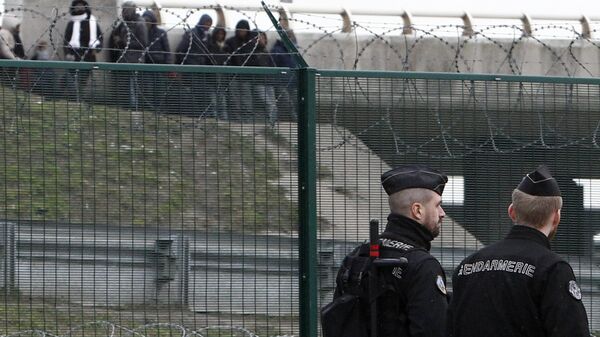The British charity Help Refugees published a report on Wednesday saying that there were over 600 instances of police brutality and harassment amongst aid workers helping the 1,500 homeless and vulnerable migrants in Northern France between November 1, 2017, and July 1, 2018.
According to the organization, French police resorted to several key tactics, including surveilling, photographing, tailing and observing volunteers, humiliating body searches, and excessive ID checks. French authorities also regularly intimidated volunteers by issuing arbitrary fines and resorting to abuse, both physically and mentally, the report says.
Specifically, the report mentions 37 incidents of physical violence, where police had shoved aid workers to the ground, forcibly taken their mobiles, and ejected them from the distribution area.
.@HelpRefugees @AubergeMigrants, @Utopia_56 @RefugeeInfoBus have released a report revealing police harassment of aid workers supporting refugees in Calais and Dunkirk. Please read the report and share this article far and wide. https://t.co/hlbVjAw0vo
— Help Refugees (@HelpRefugees) August 8, 2018
It also mentions that police conducted routine physical searches on aid workers while disproportionately targeting women. Even though female aid workers comprised 87% of body searches, only 57.2% of all aid workers were women.
In many cases, French authorities reportedly surveilled British workers and prevented them from handing out supplies such as food and water to migrants.
During the incidences, Calais authorities have often cited Article 78-2 of the French Criminal Code, which is normally used for research purposes, to instead intimidate volunteers operating there.
One such incident was shared among many in the report:
“At 9:15, I asked a police officer what was happening. He replied ‘nothing special’ and asked for my ID. I asked him why and he told me it was because of a requisition. At 9:42, I started filming a group of police officers [who] told me not to film and said in English, ‘Where do you think you are? What are you doing?’. I replied that I had the right to film. He said ‘In this case, I have the right to ask for your identification’. I explained to him that I had already shown my ID to his colleagues and he replied: “I don’t care.”
One l’Auberge des Migrants operations coordinator Loan Torondel gave his personal comments in the report after French authorities accused him of defaming the country when he exposed the sordid conditions via Twitter. His court hearing took place June 26 and judges will issue a verdict Sept. 26.
“It is worrying to see that criticism against law enforcement is becoming more and more dangerous, legally speaking, especially when we are talking about the violation of human rights,” he said.
“These months of legal proceedings have exhausted me both mentally and physically, even though I was and am still convinced of my innocence.”
Northern France field manager Maddy Allen offered her own thoughts on the matter, stating, “The scale and frequency of police harassment in Northern France is completely unjustifiable. Police forces, the very people employed by the State to provide safety and uphold the law, are violating human rights on a daily basis. The intimidation volunteers experience whilst working in Calais halts our daily operations and increases the distress and emotional toil of the situation for all those involved.”
![]() Clashes between migrants and police officers have been an ongoing problem in the port city. The BFMTV channel reported that a group of migrants had broken into an industrial zone nearby. Four police officers were injured after intervening in the crime.
Clashes between migrants and police officers have been an ongoing problem in the port city. The BFMTV channel reported that a group of migrants had broken into an industrial zone nearby. Four police officers were injured after intervening in the crime.
Earlier this month, the migrants’ right group Safe Passage was awarded a High Court case, where 530 child refugees were not separated from their families.
"Tragically, many of the children that were refused by the government with no good reason have since gone missing from French authorities' care, and we have little or no information on their whereabouts or well being," Beth Gardiner-Smith of Safe Passage explained in a press statement.
Despite the camp being dismantled in 2016, migrants continue to arrive their on a daily basis.


